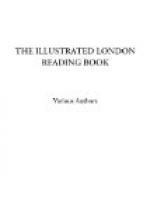Sterne.
* * * * *
THE CAR OF JUGGERNAUT.
[Illustration: Letter J.]
Juggernaut is the principal idol worshipped by the Hindoos, and to his temple, which is at Pooree, are attached no less than four thousand priests and servants; of these one set are called Pundahs. In the autumn of the year they start on a journey through India, preaching in every town and village the advantages of a pilgrimage to Juggernaut, after which they conduct to Pooree large bodies of pilgrims for the Rath Justra, or Car Festival, which takes place in May or June. This is the principal festival, and the number of devotees varies from about 80,000 to 150,000. No European, Mussulman, or low cast Hindoo is admitted into the temple; we can therefore only speak from report of what goes on inside. Mr. Acland, in his manners and customs of India, gives us the following amusing account of this celebrated idol:—
“Juggernaut represents the ninth incarnation of Vishnoo, a Hindoo deity, and consists of a mere block of sacred wood, in the centre of which is said to be concealed a fragment of the original idol, which was fashioned by Vishnoo himself. The features and all the external parts are formed of a mixture of mud and cow-dung, painted. Every morning the idol undergoes his ablutions; but, as the paint would not stand the washing, the priests adopt a very ingenious plan—they hold a mirror in front of the image and wash his reflection. Every evening he is put to bed; but, as the idol is very unwieldy, they place the bedstead in front of him, and on that they lay a small image. Offerings are made to him by pilgrims and others, of rice, money, jewels, elephants, &c., the Rajah of Knoudah and the priests being his joint treasurers. On the day of the festival, three cars, between fifty and sixty feet in height, are brought to the gate of the temple; the idols are then taken out by the priests, Juggernaut having golden arms and diamond eyes for that one day, and by means of pulleys are hauled up and placed in their respective carriages: to these enormous ropes are attached, and the assembled thousands with loud shouts proceed to drag the idols to Juggernaut’s country-house, a small temple about a mile distant. This occupies several days, and the idols are then brought back to their regular stations. The Hindoos believe that every person who aids in dragging the cars receives pardon for all his past sins; but the fact that people throw themselves under the wheels of the cars, appears to have been an European conjecture, arising from the numerous deaths that occur from accidents at the time the immense cars are in progress.”
[Illustration: Car of juggernaut.]
These cars have an imposing air, from their great size and loftiness: the wheels are six feet in diameter; but every part of the ornament is of the meanest and most paltry description, save only the covering of striped and spangled broad-cloth, the splendid and gorgeous effect of which makes up in a great measure for other deficiencies.




